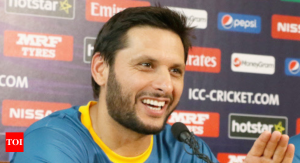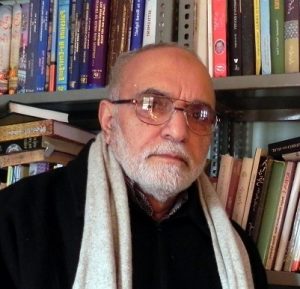Peace Watch » Editor's Take, Kashmir-Talk, Perspectives » Kashmir: Is Not Story Of A Cricket Game
Kashmir: Is Not Story Of A Cricket Game
PUNCHLINE
Kashmir: Not A Game of Cricket
by
Zahid .G. Muhammad
I am not a cricket buff, equally not a great fan of the game; the last popular legacy of the British imperialism in all its colonies. Perhaps, in the crowd of millions of Kashmiris, I am an odd man out whose adrenaline never goes up while watching India-Pakistan cricket test matches, one day and T-20. My heart never collapsed for Indian cricket teams like Professor Akbar Ali Khan of Hyderabad and nor like that of his Kashmiri orderly for Pakistan- both were fitted with pacemakers by debit to the state exchequer. Like Lord Loam in J. M. Barrie’s famous play ‘The Admirable Crichton, I used to buy sports magazines and adorn my small library with biographies of famous cricketers but never read them. During past thirty-five years except for some odd articles on cricket diplomacy of General Muhammad Zia-ul-Haq and General Pervez Musharraf, Presidents of Pakistan, or Prime Minister of Pakistan, visit India to watch World Cup Semi-final for seeing a thaw in India-Pakistan relations, I have never attempted to write on cricket. It has not been my cup of tea.
 A couple of days back, for the first time news relating a Pakistani cricketer beamed by all Indian satellite channels followed by hoarse cries of triumph by some anchors attracted my attention. The video clipping an address of 38-year Pakistani cricketer Sahibzada Mohammad Shahid Khan Afridi, remembered by his fans as Boom Boom to students at the British parliament had excited many in India. Many television channels telecasted at regular intervals for a full day. Some anchors in their usual scourge against Kashmiri youth asked them to see the reality. Some most familiar panelists known for their Kashmir bashing jubilant over the purported statement in bravado twisted their walrus whiskers over the comment of Mr. Boom Boom.
A couple of days back, for the first time news relating a Pakistani cricketer beamed by all Indian satellite channels followed by hoarse cries of triumph by some anchors attracted my attention. The video clipping an address of 38-year Pakistani cricketer Sahibzada Mohammad Shahid Khan Afridi, remembered by his fans as Boom Boom to students at the British parliament had excited many in India. Many television channels telecasted at regular intervals for a full day. Some anchors in their usual scourge against Kashmiri youth asked them to see the reality. Some most familiar panelists known for their Kashmir bashing jubilant over the purported statement in bravado twisted their walrus whiskers over the comment of Mr. Boom Boom.
In his country, some newspaper headlines read, “controversial remarks on Pakistan, Kashmir land Shahid Afridi in hot water.’ The AJK Prime Minister, Raja Farooq Haider attributed motives to his statement. Stating, ‘Kashmir is a matter of life and death to us,’ he saw the statement “driven by his desire to become a part of the Indian Premier League (IPL).”
In the video clipping repeatedly telecast from many satellite news channels across India, he was heard saying, “I say Pakistan doesn’t want Kashmir. Don’t give it to India either. Let Kashmir be independent. At least humanity will be alive. Let people not die. Pakistan doesn’t want Kashmir. It can’t even manage its four provinces. The big thing is insaaniyat (humanity).”
Minus a couple of cricketers and journalist from Srinagar, defending his statement as pro-Kashmir the flamboyant all-rounder and former captain invited criticisms on the social media. The remarks in as much as stating that his country cannot manage its four provinces, tacitly suggesting Pakistan was a failed state was seen as an embarrassment to his country and the government headed by cricket legend Imran Khan. For his purported statement that “Kashmir is not even an issue. The world has made it an issue” had also aroused a sharp reaction on the social media. The backlash in a section of his country’s press and microblogs, on his statement put the former captain who had internationally drawn big applause for his aggressive batting on defense. To clarify his position, he clarified his position twice on the microblog Twitter. In 7.16 PM tweet of November 14, which was liked by over eight thousand people he wrote:
“My clip is incomplete & out of context as what I said before that is missing. Kashmir is unresolved dispute & under brutal Indian occupation. It must be resolved as per UN resolution. Myself along with every Pakistani support Kashmiri freedom struggle. Kashmir belongs to Pakistan.”
The second tweet of the cricketer seems in synchronization with his earlier April 3, 2018 writing on the microblog:
“Appalling and worrisome situation ongoing in the Indian Occupied Kashmir. Innocents being shot down by oppressive regime to clamp voice of self-determination & independence. Wonder where is the @UN & other international bodies & why aren’t they making efforts to stop this bloodshed?”
For him, the tweet, unlike the recent one had invited lots of brickbats for him, and some television channels ran packages against the cricketer. Those who criticized his remarks about the human rights situation in Kashmir included topmost Indian cricketers including Virat Kohli, Suresh Raina, and Gautam Gambhir. The cricketer addressed by many of fans as ‘Lala’ in yet another tweet responded to his friends:
“We respect all. And this is an example as a sportsman. But when it comes to human rights, we expect the same for our innocent Kashmiris.”
The whole point, in writing this column is not to debate whether one of world’s best batsman was caught on a wrong foot or not. But to tell that the Kashmir narrative has an inherent strength that makes many in power panic to bolster the ‘dominant discourse’ from an impromptu statement of a batsman. Both, for New Delhi and Islamabad it will not be possible to erase the whole truth about the Kashmir Dispute- whether one chooses to call it a problem or an issue. It is an integral part of the proceedings of the Indian Constituent Assembly and the debates thereon. It is part of the genesis of Pakistan. It is part of the  history of the United Nations Security Council; it continuously resonatede on its floor as a major dispute of international implications and caused one after another resolution in support of granting the fundamental right to the people of the state. Even seventy years after it stands on its agenda as an unresolved dispute – with UN Secretary General asking the two countries at regular intervals to resolve it. There has been hardly a year, when Kashmir has not been of debated at the United Nations General Assembly.
history of the United Nations Security Council; it continuously resonatede on its floor as a major dispute of international implications and caused one after another resolution in support of granting the fundamental right to the people of the state. Even seventy years after it stands on its agenda as an unresolved dispute – with UN Secretary General asking the two countries at regular intervals to resolve it. There has been hardly a year, when Kashmir has not been of debated at the United Nations General Assembly.
The ‘hegemonic discourses’ and propaganda cannot erode the inherent strength of any popular narrative. Had leadership of the Indian Sub-Continent been scared by the propaganda of the oppressive avatar of the colonial rulers they would not have seen them sailing across the Indian Ocean lock, stock and barrel after a few decades. Had Gandhi, Nehru, and, Patel given heed to the statement of Winston Churchill during debate on Independence Bill, that “If Independence is granted to India, power will go to the hands of rascals, rogues, freebooters; all Indian leaders will be of low caliber and men of straw,” The realization of the cherished dream of Independence would perhaps have been postponed for some time. Nevertheless, it was the strength of the people’s narrative that every critical juncture gave a new resolve to Indian leadership to fight for its goal.
Filed under: Editor's Take, Kashmir-Talk, Perspectives · Tags: Kashmir Cricket, Shahid Afradi Kashmir, Shahid Afradi Tweet, Zahid G Muhammad








